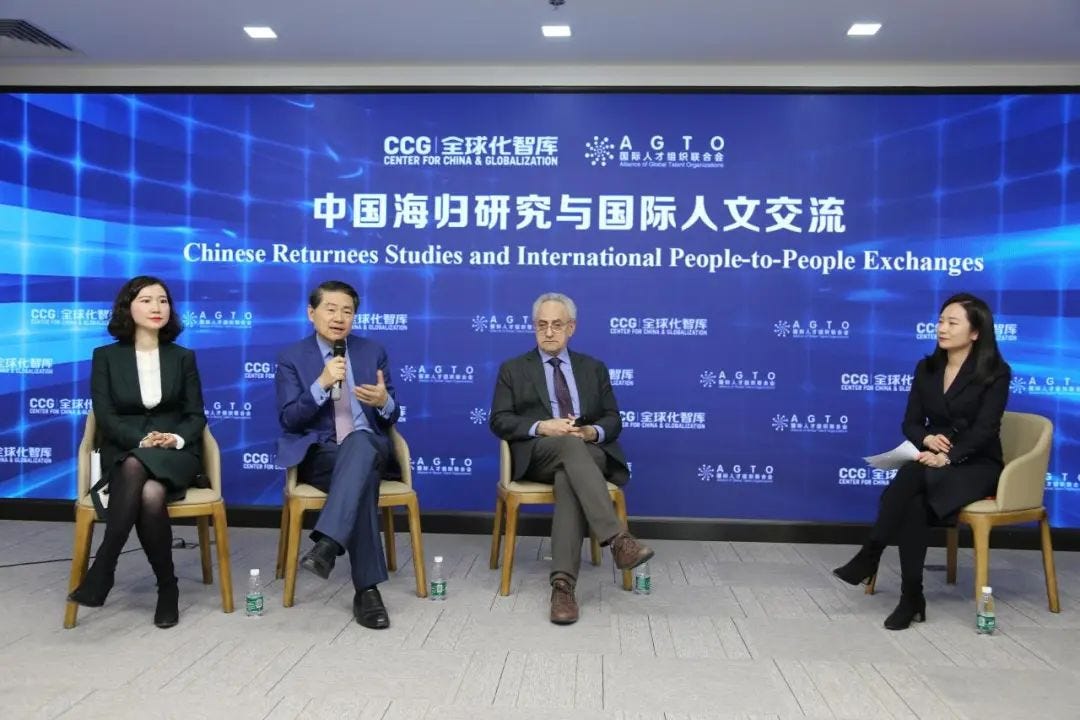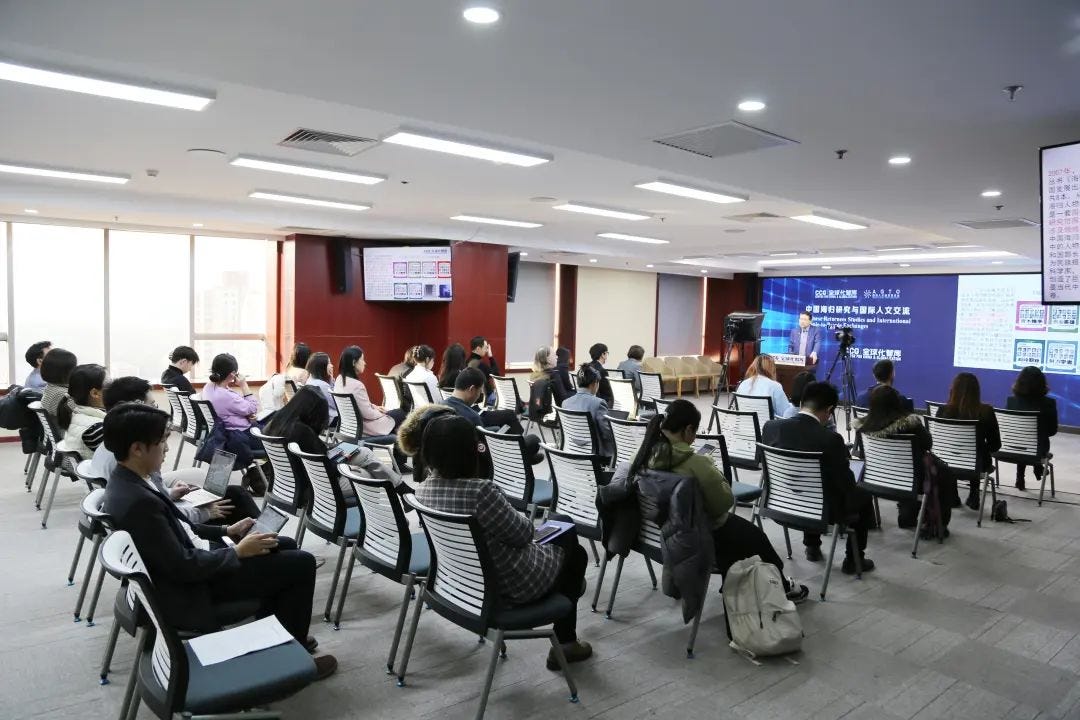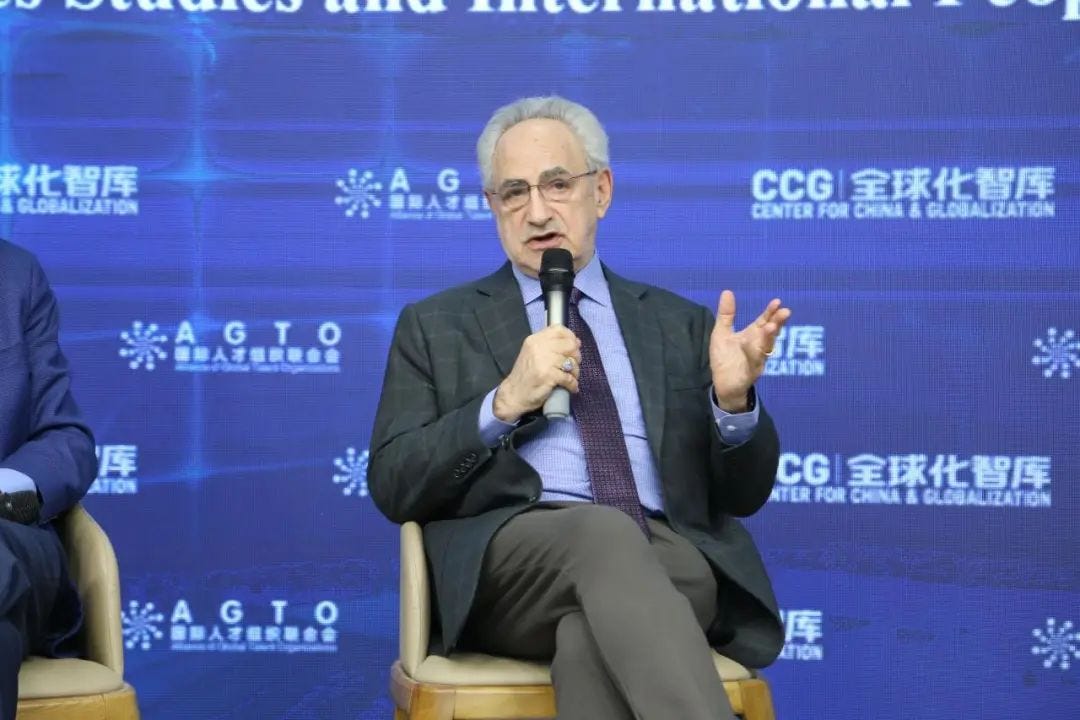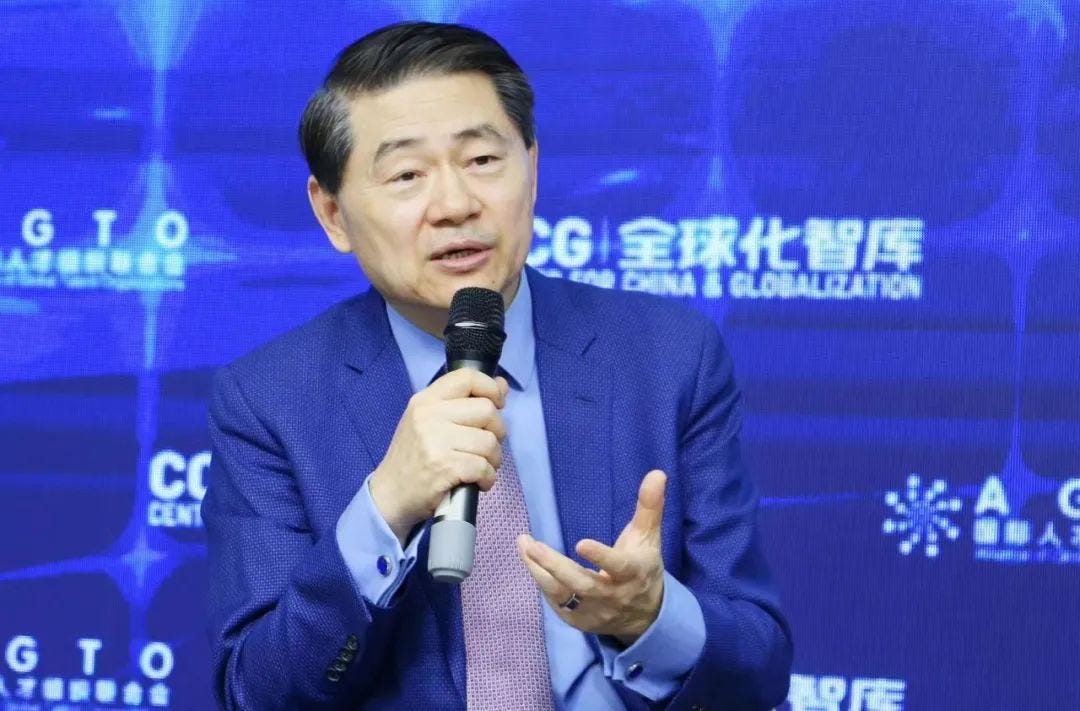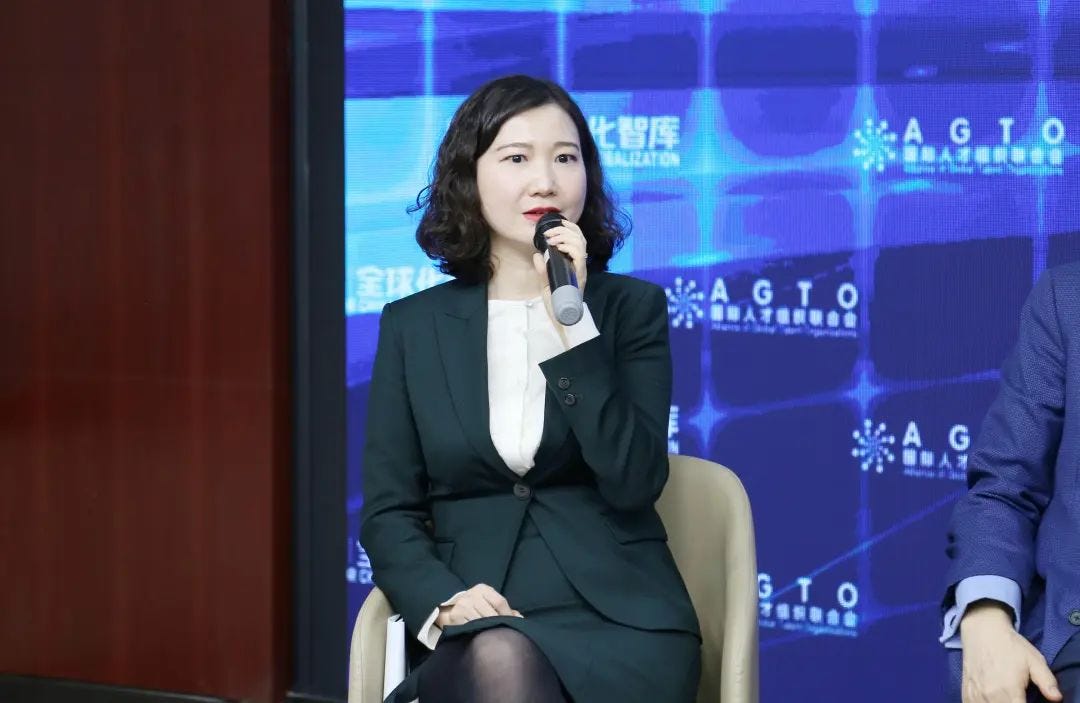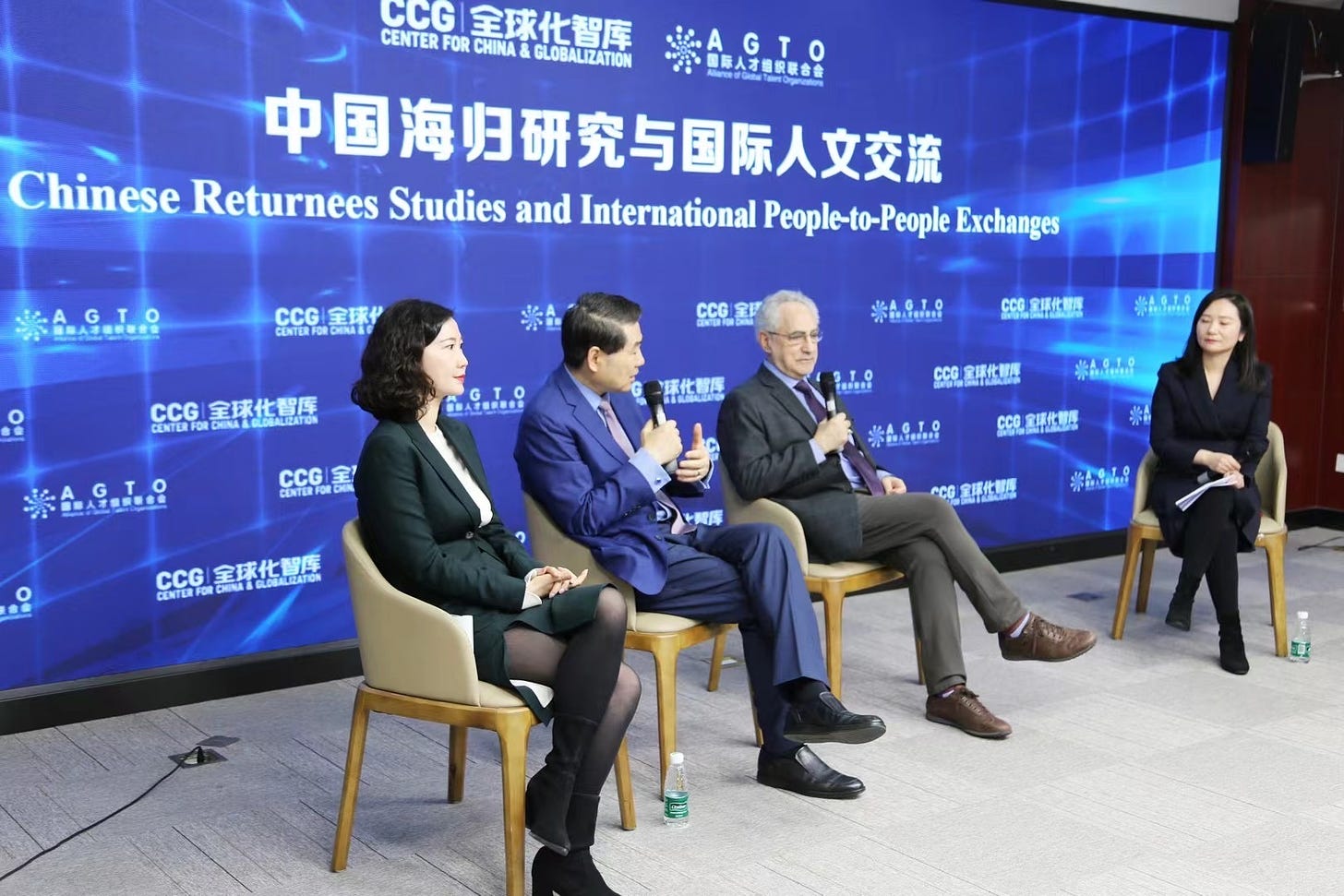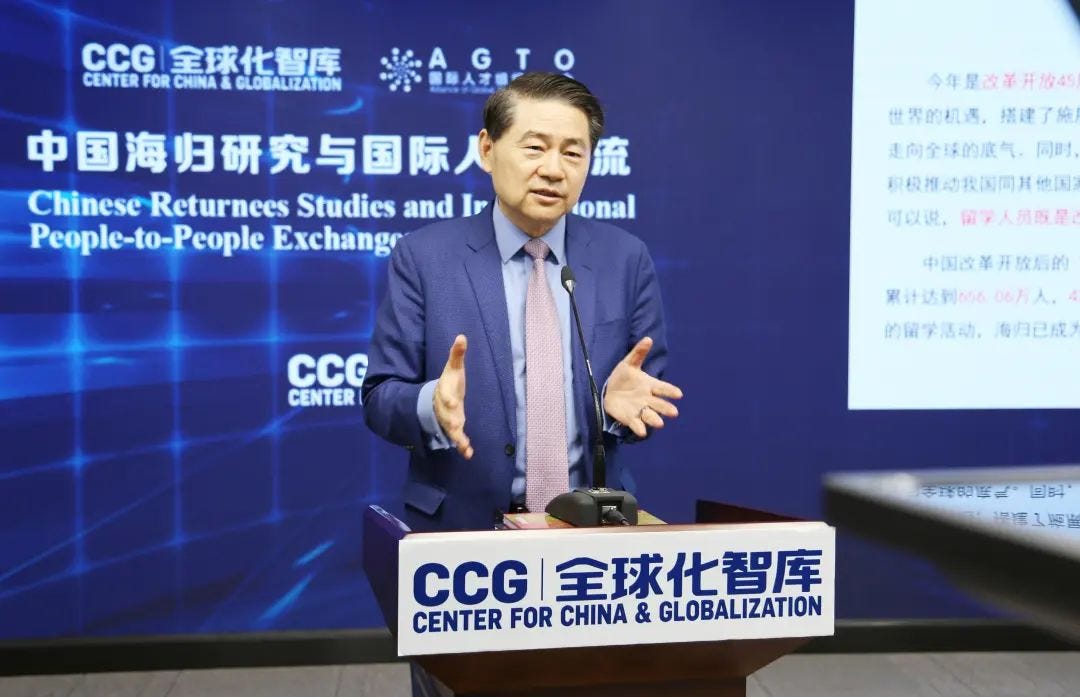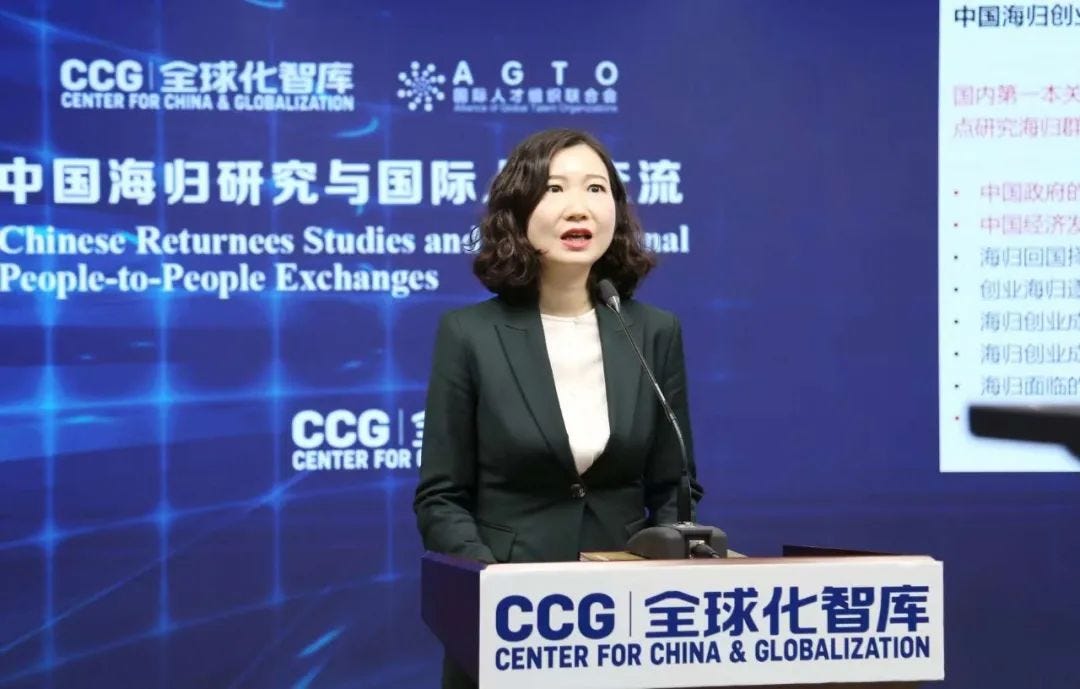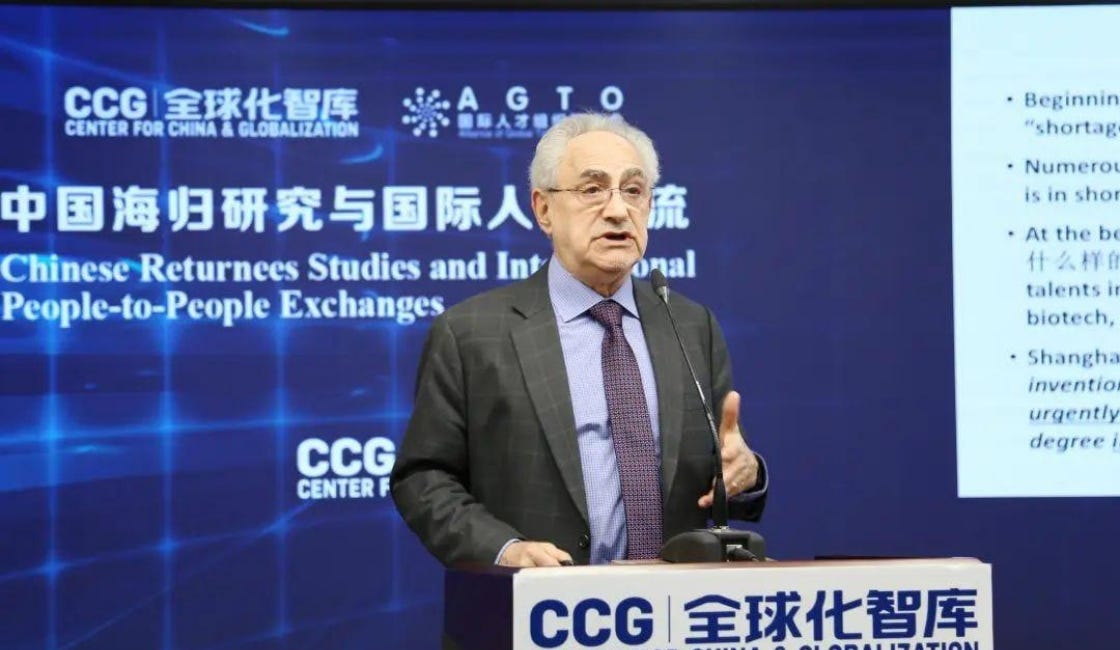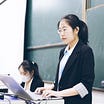How to attract 50,000 young Americans to China: insights from CCG leaders
CCG and Alliance of Global Talent Organizations co-hosted seminar featuring dialogue between Henry Huiyao Wang, Mabel Lu Miao, and David Zweig.
Hi, this is Yuxuan Jia in Beijing. On Dec. 28, 2023, a seminar titled "Chinese Returnees Studies and International People-to-People Exchanges" was co-hosted by the Center for China & Globalization (CCG) and the Alliance of Global Talent Organizations (AGTO). AGTO is a non-governmental organization proposed by the CCG and launched at the third edition of the Paris Peace Forum on November 13, 2020.
The seminar focused on the contributions of Chinese students educated abroad to the development of China and the country's communication with the world, especially in light of President Xi Jinping's announcement in San Francisco that "China is ready to invite 50,000 young Americans to China on exchange and study programs in the next five years."
The event featured speeches by David Zweig, Professor Emeritus at Hong Kong University of Science and Technology (HKUST), CCG Vice President, and AGTO's director of research; Henry Huiyao Wang, CCG President and AGTO's Director-General; and Mabel Lu Miao, CCG Secretary-General and AGTO's Deputy Director, followed by a panel discussion of the three.
Dr. Henry Huiyao Wang emphasizes the significance of Chinese returnees in the context of China's 40 years of opening up. He notes that the phenomenon of Chinese students studying abroad and returning has become a global trend. With millions of Chinese students having studied abroad and a substantial number returning to China, the CCG has been at the forefront of researching this trend, producing numerous publications in collaboration with academic institutions.
Dr. Mabel Lu Miao stresses the importance of people mobility and enterprise globalization as pillars of the CCG's globalization theory. She highlights the role of student exchanges in fostering mutual understanding and strengthening bilateral relations, particularly between China and the U.S. Miao also references China's historical efforts in inviting foreign students, underscoring the potential of these initiatives to bridge cultural gaps and promote global peace.
David Zweig discusses the factors influencing the return of Chinese students from abroad, noting that government influence is often less significant than other factors such as market opportunities, family ties, and work environments. He also touches on the impact of geopolitical tensions on the global flow of talent, suggesting that these tensions could either hinder or facilitate the return of Chinese talent.
The event was covered by China News Service, www.china.com.cn under the auspices of the State Council Information Office, and China Scholars Abroad under the auspices of the Ministry of Education. The full video of the event is available on CCG's official WeChat account and YouTube.
CCG Update published Prof. Zweig's speech last Sunday. Below is his dialogue with Henry Huiyao Wang and Mabel Lu Miao, moderated by Luo Yan, Communications Director of CCG. Speeches delivered by Henry Huiyao Wang and Mabel Lu Miao will also be published subsequently.
Luo Yan (Host)
Good afternoon and welcome everyone. In the presentation session, we had three guests introduce their returnee research results in Chinese. Since CCG has a large international audience, in the discussion session, we will communicate in English. Firstly, I would like to introduce our three guests.
David Zweig is the vice president of CCG, and research director of AGTO. He studied in Beijing in the 1970s. Since 1991, he has surveyed and interviewed returned academic scientists entrepreneurs, and employees all over China. He has authored and edited 10 books, including Internationalizing China.
Doctor Henry Huiyao Wang is the president of CCG. He was a counselor to the China State Council and a vice chairman of the China Association for International Economic Cooperation. He holds the position of vice chairman at the China Public Relations Association and serves as a director of the Chinese People's Institution of Foreign Affairs. He is a steering committee member of the Paris Peace Forum and the editor of the Springer Nature "China and Globalization" series. He has published 100 books in English and Chinese along with hundreds of journals, articles, and opinion pieces on global relations, global governance, global migration, China's outbound and inbound investment and trade, and Chinese think tanks.
Doctor Mabel Lu Miao is the Secretary General of the CCG. She also served as a founder and secretary general of the Global Young Leaders Dialogue (GYLD) program, deputy director general of the Alliance of Global Talents Organization (AGTO), the secretary general of China Global Talents Society, secretary general of the Policy Advisory Committee of the Western Returned Scholars Association, and deputy director general of the International Writing Center of the Beijing Normal University. Her main research areas include think tank construction, globalization theory, enterprise globalization, and Chinese returnees and study abroad development. She has published many academic papers and professional articles and she has published a number of academic research books, including the series of the Blue Books on International Talents.
We are delighted to have you here. You've just introduced your research results in the field of international talents and returnees in the past decades. I'm very interested in why you all chose this field and studied for so many years.
Henry Huiyao Wang
Okay, and let me start. I think we had a very good afternoon. We had a symposium on the Chinese returnees’ research. Center for China and Globalization, and the Alliance of Global Talents Organization are very interested and very dedicated to the study of the Chinese returnees and its impact and importance. So I think this roundtable discussion on the roles of Chinese returnees, combined with 20 or 30 years of studies of the Center for China and Globalization is really significant. I want to give a background about this roundtable in English of what we have studied. We have just gone through previously three long presentations which are in Chinese, but we hope to introduce to our international viewers how CCG has done studies and how it's in line with China's 40 years of opening up. And the returnee phenomenon has really gone up with time and has become a global phenomenon. Up to now, almost 10 million Chinese students have studied abroad over the last 30, 40, or 50 years and about 78 million have already returned to China, so we are studying this phenomenon and CCG is really at the front and the center of these phenomenon studies. We have published over 30 to 40 books in both Chinese and English including almost 20 blue books in collaboration with the Chinese Social Science Academy on this phenomenon. This is where we started today. So I'm very glad that I'm going to discuss this with David Zweig, CCG Vice President, and Doctor Miao, my co-author of many of the studies.
Luo Yan, you're chairing this roundtable, so maybe you can start. I just want to give some background to international viewers about what we have done, like what I've just started talking about in the previous Chinese sections.
David Zweig
Thank you. I was trying to think of some good stories and one particularly came to mine, which was, as I mentioned in my presentation, I had a co-researcher, a gentleman named Shao Wei (邵巍) who was the deputy director of the Chinese Service Center for Scholarly Exchange (留学服务中心), a center for overseas education. And their job primarily is to manage students going overseas and then when students come back, help them find jobs. Shao Wei is very interested in it. Now he is retired. I haven't seen him for a couple of years. He had a PhD from Peking University in education. He liked data, which is one of the reasons he liked me. And I remember he invited me to a conference in Guangzhou and we were on a panel together. He was the chair of the panel and a Chinese researcher from the Guangzhou Academy of Social Sciences gave a talk about the role of the government in encouraging people to come back. He talked about a lot of things, saying the government does this and the government does that and the influence is so great. Then it was my turn and I said I have to disagree with this person. I said, "I've done a survey. And when I asked people why they came back, I gave them a list of reasons to choose. And I said if you look at the results of that, for entrepreneurs, the main reason is the market; for many scientists, it's their own unit that encourages them to come back – some come back for family, and some come back for different reasons. But the government role is not very high in terms of the selection." This is back in 2000. So that was my point. Then a woman puts up her hand in the Q&A period. She said, "I'm puzzled. Here we have a Chinese man who's telling us that the government's role is really big, and here we have a foreigner who's telling us that the government's role is not so big. Who should we believe?" Shao Wei looks at her and says, "Go with the data." Who's ever got the data? That's the person.
Henry Huiyao Wang
What I want to ask is, now we're in the 21st century, but particularly in the last number of years, the geopolitical situation has gotten very tense. But also importantly, China has now become the second-largest economy. Of course, we need more global talents. You've been the top experts in the world and studied returnees. Then what do you think about returnee phenomena? Will that be interfered with too much by the geopolitical phenomena? And can we maintain this global talent flow, which I think is good for both developed and developing countries, and all of us researchers in this field like to see the continuity of the global talent flow? How do you see the challenges and obstacles that we can overcome? We see now studying abroad has become more diversified. I mean, studying abroad used to be the fact that people all went to the U.S., but now people go to Europe and other countries; and now many go to developing countries, such as ASEAN countries, Central Asian countries, and even African countries and India. So do you think that will become a returning phenomenon? How long do you think that will last? Because the number of students studying in some countries is decreasing. Japan, for example.
David Zweig
Let me ask you a question. Will people see the presentations that we made? Or should I just assume that I can repeat what I've said? I see. Okay.
So will the flow continue? Well, I think the flow will continue. I think the circulation will continue. But as you said, Henry, I think that the global situation is complex. Now, in some ways, the global situation is bringing the Chinese back, right? The United States government under President Trump made it very uncomfortable for Chinese and some Chinese researchers to stay in the United States, which I think is a really silly thing to do because now the United States is recognizing that they need that talent, and President Biden wants to bring the chip industry back to America. All of a sudden they realize they need these talents. And they need master's level students and they need graduate students who can come and work in American companies. At the same time, they've made it reasonably uncomfortable with some racism. Lots of Chinese Americans do not feel very good. The surveys have shown that Chinese Americans are pretty unhappy with their situation in America. Now, one of the questions is, will those people come back to China or will they move on to other countries?
As America has made it uncomfortable, according to data, the number of Chinese students coming to America is dropping even if the number of foreign students coming to America is recovering by around 3.8% in the 2021-2022 school year. The vast majority of them are actually Indian. The Indian students in America are up 19%. The Chinese students are down about 8%, which is a real loss for the United States.
But whether the advanced talents will come back to China or not depends on the environment, be it the macro environment or the microenvironment. I mean people will not come back if they think that they are not going to get the benefits that they have been promised. They will not come back if they feel that they have to watch their backs when working in a unit, or that maybe the boss has his own people in the unit that he's gonna protect. And when they go back and work in a university and the president of the university is going to promote his own Ph.D. students, hence they may not get the treatment they want. those are the things that I think China should seriously think about. For that reason, I think that the more university presidents with foreign PhDs or overseas post-doctoral experiences, the more they will understand what an open good environment should be for research. Then that will improve the situation for people who are thinking about coming back.
Henry Huiyao Wang
Okay, I hope that the political situation won't interfere too much with this normal academic and people-to-people exchange and student flow. So as a think tank, I think we are still a strong believer in student exchange. I think such an exchange will benefit China, the U.S., and many other countries. That's what I would say.
Luo Yan (Host)
China-U.S. relationship is now facing a lot of challenges. Recently, President Xi announced that in the next five years, China will invite 50,000 American youths to China for exchange and studies. What impact will this have on China-U.S. relations in the future?
Mabel Lu Miao
I'm very pleased to share some views on this occasion. Actually, we have done a lot of work. I think CCG is productive in this field of students studying overseas and returnees. I think it's a serious study of people's mobility and talents. I think one of the pillars of CCG theory of the concept of globalization is people's mobility. We think there are two strong pillars of globalization. One is people mobility, the other is the enterprise's going global. So we would like to delve into the two pillars.
Today we are very pleased to share our views on one of the two pillars, which is students studying overseas and returnees. For me, I think it would be a strong encouragement if President Xi committed in San Francisco that China would like to attract more than 50,000 students to study in China in the coming years. I think this practice injects momentum into the process of people mobility, especially for international education. I think China will honor its commitment and spur technological, educational, and youngsters communication in the coming years. In the past four decades, maybe the commercial sector, multinational companies, and international trade themselves are the keystone of China-U.S. relations, but for me and CCG, in the past few years, a very important finding is that the people-to-people exchange between the U.S. and China and between China and the rest of the world, which comply with today's theme, is actually the true keystone of the geopolitical picture, of global peace and China-U.S. relations. So that sends a strong signal to the world that China will work with the U.S. in the future.
I remember in history, China attracted 3000 Japanese students and youngsters to China to strengthen communication. It's a very important method for China and the rest of the world to improve the people-to-people movement and to promote mutual understanding.
I think in the future, the next generation will be an important part of the people-to-people exchange. So if we can attract foreign youngsters to study in China, to know China. David is a typical example. In the 1970s, he studied in China and found his passion for Chinese studies and transnational studies, especially in the field of returnees. In this process, he understands China more, then moves to play a significant role as the bridge between China and the rest of the world. I think that is a good example.
So I would like to witness more people stand out as the strong bridge and the ambassador between China and the U.S. through the program you mentioned in the future and play a more significant role in our world's peace. This is a very important method and program.
So CCG would like to do something. We have the GYLD program. We want to attract more young talents to understand more about China through CCG's activities and events. Thank you.
David Zweig
I will say that it will be a challenge to get 50,000 students to come to China. It's a good goal, but I think it will be a challenge. And I think that many of the people who come will be coming because they want to graduate and get a job.
I think one of the things that's important for young Americans would be to come and try and get a job. They hope to get to know China, learn the language, and even get a master's degree in MBA at a place like Tsinghua University or Peking University. These are very good schools here where they can get a degree and be able to understand China better. And I think it's important that China creates an atmosphere that tells those young people that they are welcome here to study and get a job, and which shows that China is open to foreign companies.
Henry Huiyao Wang
I think this is really incredible. President Xi announced that China would invite 50,000 youths to study in China while he was attending the China-U.S. Summit in San Francisco. I think this is a major decision and a tremendous goodwill of the Chinese people.
Absolutely, you said there are some challenges. I can understand that because we are now facing a tight geopolitical situation now. But I think, as you said, China is a big market, the second largest economy, and is in great need of global talent. How to achieve that goal in five years' time? You know, China has 31 provinces and 3,000 universities. Many of these universities are on the list of the world's top 100 universities. If some quotas are allocated to different cities like Beijing, Shanghai, Hangzhou, Chengdu, and Guangzhou, all those cities must have the initiative and enthusiasm to welcome foreign youngsters. And then, offering degree programs is not enough, they should be summer programs, short-term programs and they can provide even longer programs.
I remember President Obama used to announce the 100,000 Strong Initiative which planned to gather 100,000 American students to study in China, but they haven't realized that. The peak number was 15,000. And now there are only about 800 American students studying in China.
So I think this is an extremely great initiative on the Chinese part to show welcome and hospitality and to send a signal to the universities and companies across China that they should welcome American youngsters to China. Probably it is difficult, but the two countries have hundreds of sister cities and strong links between NGOs, think tanks, and universities. If every party is mobilized to welcome their American counterparts, the goal might not be that difficult to realize.
David Zweig
I also want to stress that we are talking about American, the Sino-American relations. But I think it's important to realize that there are other countries that have many students here. And in the post-COVID era, the rebound of China did not happen at the pace that I thought China would have expected. For example, Korean students used to be the largest group of foreign students in China. They haven't yet reached the previous level.
Henry Huiyao Wang
Well, I think it's partly true because there would be flight issues and cost issues. And we have just stepped out of the COVID. I think the momentum is good. At least the top leadership of China called for and invited 50,000 in the next five years. That is a long time span. Things will gradually change. And not only for U.S. students, China welcomes students from all over the world. We can see more and more students are coming back.
Mabel Lu Miao
From my observation, I find that the students are a catalyst for the people-to-people exchange and China's relations with the rest of the world. We know the pandemic curbed people-to-people exchange and cut off the communication of policies and many other fields between countries. But the problem lies in how to resume it. We should not only depend on the commercial sector, like resuming international flights. It's not easy. President Xi sent this signal to the world by himself. It is a strong signal not just for the U.S. but also for China's domestic market. All of the leaders and factors, from the top to the provincial to the municipal level, can be mobilized to do something to press ahead with China's relationship with the rest of the world. That is a dynamic process that deserves more attention. That's why I want to stress the significance of this signal. Then we can see governments and departments at all levels and more companies will carry out more policies in this field in the future.
This is my hope. Like Henry said, China has its own political system. They can allocate tasks to local governments and different departments and issue more sub-policies to support the exchanges between students from China and the U.S. That's why I want to mention the history between China and Japan. We attracted more than 3,000 Japanese youngsters to China and there were the same number of their Chinese counterparts going to Japan to resume the China-Japan relationship. I think currently we can still pool the strengths of Chinese local governments, departments, universities, and other institutions to attract more U.S. youngsters. CCG would like to attract youngsters as well.
Henry Huiyao Wang
You just showed us in your presentation that you graduated from Peking University. And many of your classmates are ambassadors, counselors, or even ministers. Jaime Florcruz is now the ambassador of the Philippines in China, right? So you have a class of masters. So how important are the student exchanges and studies in China?
David Zweig
One thing for me to do would be to have a meeting with my graduating class at Peking University. I can invite them here and see if they can say something about their experiences and opening up. As you guys were talking, I was thinking back to the 1980s. Times were pretty tough when we were students. I just want to emphasize the changes that have happened in China over the last 40 years. When we came here as the students of Peking University. For the first round of the dinner, we could get a Mantou. But if we wanted a second helping to digest the starch, we had to have a bottle of water. At that time, we had to have cornbread with no sugar and no flour.
So that whole group of people knows the changes that have happened. And we support an open China and our commitment is to witness an open China, a China that engages in the world. We also hope to see our own government engaging with China. And I remember when they were building new dormitories in the 80s, we lived in Building No. 25 at Peking University, which was rough going. But then they built a really nice campus.
As you say, this is a country with a system where if the leader calls for something to happen, the locals are likely to respond. So hopefully when the locals respond, the foreign students who have their own agencies can make their own decisions to come and visit. Even short-term visits are always quite good because they can let you know what the place is really like and that maybe some of the publicity overseas is harsher than the reality. And I think that China is moving into a period with the General Secretary Xi's statement of 50,000 people coming. I think all of that will improve relations with the United States. I'm hoping that it foretells a better engagement with the world than that we've seen in the last little while.
Luo Yan (Host)
Okay. We just talked about the impact of the pandemic on the international people-to-people exchange. And now we are entering the post-COVID era. What do you think about the new changes in the role of returnees in this new area? And how can they make better use of the advantages and contribute to China's development and international people-to-people exchange?
Henry Huiyao Wang
Thank you. Actually, we divide the Chinese returnees in modern history into five phases. We are probably at the fifth stage which actually coincides with the 45 years of opening up. But I see the returnees' role is still significant, because maybe at the beginning when Deng Xiaoping called for opening up, we needed a lot of scientists and teachers coming back. And later on, we saw a lot of entrepreneurs coming back. And now you can see the number of returnees and Chinese students studying abroad has reached almost 10 million. That's a large number. And then now we are in a more fragile geopolitical world. And then we have two wars going on in Ukraine and the Gaza Strip. And we have a very tight China-US relations. We're getting into a multipolar world, but there's no multipolar system to support that.
So a new task for returnees and international students, scholars, and talents is to have more people-to-people exchange, diplomacy, and understanding. And then the other thing for Chinese returnees is to do is to form the circulation at home and abroad. I was interviewed by China Youth Daily yesterday, and they have noticed a phenomenon that returnees do circulation both within China and in the international community. That means there are more Chinese young people, even though educated in China, now going to work on the international stage, in different countries. They are now circulating around the world. And there are two million Chinese working in Africa, and there are many working in Central Asia. And things like that.
In the new era, in addition to making contributions to the scientific, entrepreneurial, and public domains in China, there is a new role added and emphasized now for Chinese overseas students. That is having more people-to-people exchanges among different countries to help improve relations and think about future global challenges like AI. They need to consider how they can be a part of this system that can really link the world together.
I think that in the fifth stage of the movement of Chinese studying abroad, we need more people like that to maintain and repair relations. We need them to be the ambassadors, connecting China and the outside world. So that's probably a new role I've found lately particularly out of our own experience. We found there are more people who like to hear directly from people who have an international knowledge background. We need more and more people like that. So that's why I strongly echo President Xi's statement that China will invite 50,000 American youths to China. Of course, we welcome thousands of youths from other countries to China.
David Zweig
You are saying this added role for the young people. I think CCG should think of the role. There used to be a lot of meetings between Chinese government officials and their counterparts from other countries. The people-to-people exchange you have talked about is kind of dried up by COVID. And now the geopolitical situation has made it difficult to get that restarted, though I understand the Biden administration and Chinese side have started to pick it up. But I think on the issue of talent, there needs to be dialogues. It's really important. Both sides recognize that there is a lot of misunderstanding and there are difficulties in the bilateral relationship. And in many ways, it is the overseas students in the United States or Canada who are the victims. They are the ones who have really suffered from this difficult bilateral relationship, and they really have an interest in some kind of dialogue, CCG is the second tier or Track Two organization that needs to find people to talk to. I know that the National Academy of Sciences in the United States is very interested in and trying to understand for itself how America can get more overseas talents and get them to come and stay. So I think there's an opportunity for more dialogue. I'm retired, but I think those are the kinds of things that really need to be done, based on which we can stabilize relations.
Mabel Lu Miao
I would like to echo with the two professors. Yes, the mutual understanding is more and more significant than before. People say it's very hard to get back to the golden time of the China-U.S. relationship in the past four decades we have done. But I think we still need to understand and explore how to coexist with each other. This is the final point we have to face. The U.S. and China have students studying in each other's countries. But there's a big deficit. There are much more Chinese students studying in the U.S. than American students studying in China. There are just hundreds of American students studying in China right now. The point is how to fill the gap. I think that explains why President Xi himself sent the signal to the U.S. that we would like to have more American students study in China. So as David has mentioned, we need more platforms like CCG to offer more organized dialogues. But who will do that? Maybe it is the turn of Henry and me and our colleagues. In the future, more efforts need to be made by people from some think tanks in the U.S. Some of them have knowledge of Chinese history, as they have once learned something about China in the U.S. Such experiences are very important for them, through which they have established people-to-people connections. They have a kind of chemistry with Chinese society. They have inspiration from Chinese culture. They can do something. After all, the lack of understanding of and experience in a country would lead to weak confidence in communication, especially in a period of serious geopolitical landscape. So it is required that we have more such students to study China and build confidence to bridge gaps, offer the platforms, and then move forward to the second track.
David Zweig
I think we have moved to the second track fast, to be honest. And I think that it's important for both sides to recognize that they need to do that. It's important that President Xi called for 50,000 students to study in China. But there also needs to be an effort on the Chinese side to initiate a dialogue about this. If you want to talk about the overseas students and the exchange, let's have a dialogue about it. You could get the support from Natural Science Foundation of China and the National Science Foundation of the U.S. Those are two major funding agencies, both of which are deeply involved in this process. We need both sides to be willing to carry out that kind of dialogue. Five years is a long time, given the tensions in the world right now.
Henry Huiyao Wang
Well, I think it's still a bright spot even though we have so many difficulties. But at least China has taken the first step to announce that. Of course, we need more dialogues not only among these foundations, but also universities, NGOs, think tanks, and even high schools. So there are many items on the agenda like training. And different cities can have different arrangements. There are so many things to do, and let's try our best.
Luo Yan (Host)
Over the past 20 years, CCG has continuously put forward new concepts about studying abroad and formed a new narrative about the returnees. After so many years of development, will there be returnee science or theory in the future?
Henry Huiyao Wang
Well, I try to answer this first, as we are concluding this dialogue. I think it depends on whether it is going to be a subject. But CCG has already contributed to the global talent as a major. We have actually generated the first textbook in China on global talent, which is published by China Labour & Social Security Publishing House and has been used in universities. So I think returnees, overseas students, and migrations, in that sense, are all part of the continuously developing theory. CCG has been dedicated to that, and that's why we're having this dialogue today. We want to emphasize in a globalization era why global talent, global mobility, and global circulation are getting more and more important, particularly people-to-people exchanges. And we have just gone through the COVID which suspended our international communication for three years, particularly for China. So it's of paramount importance that we revive this people-to-people exchange, including educational exchange programs, tourism, and the flow of other aspects. In that sense, we need to revive the studies on that too.
CCG is privileged as the leading think tank on migration study and student exchanges. We've been doing that for 20 or 30 years. Our publications have testified that.
To conclude, I think your question is very interesting. When asked about whether we have a continuous interest and whether this can evolve into a subject, I'm sure the answer is yes. David would probably agree with that. And we have to continue. We have published almost 20 blue books, supported by China Social Sciences Academic Press. They have certain criteria for publishing in the last 10 to 20 years, which is remarkable. There are not any other think tanks in China that have done as many studies in this area as we have. And we want to thank our researchers, and our government is also very supportive, as are our international friends and scholars. We want to continue to do that and I think this is one of the areas that CCG really pays efforts. Our focus is more diversified, involving many other areas such as globalization, global governance, international relations, China-U.S. Relations, and migration. Student exchanges and returnees are still very important as has been reflected on this point, given the critical stage of the 45th anniversary of opening up and the 45th anniversary of the establishment of China-U.S. diplomatic ties. We are thinking about the returnees' position. The number of exchange students has grown from zero to almost 10 million. And China welcomed half a million foreign students to China before the pandemic. That's an enormous force to change China, shape China, and strengthen China's relations with the U.S.
David is a good example. He studied at Peking University 34 years ago. Now he has become a top expert on returnees. Just to put it in a nutshell, I want to conclude that this is really a great area. We have studied a lot on that and we will continue to do so. And we feel very proud of that.
David Zweig
I would use this opportunity to emphasize the fact that we need to do more and we need to continue. As more people come back, even if people don't come back, we have to do research on those who come back. Why do they come back? How is their life after they come back? What kind of situation they are facing? As I have mentioned in my own theory involving shortages and the environment, we have to improve the environment for people. But I would call on increasing the opportunity for us. As a foreigner, I've been doing research on this for a long time. I hope that I can be given the chance to keep doing the research and I'll continue to create what I can to help you build your theory and test my own views on this. People want to continue to be able to do research in China. I think it's important that we be allowed to continue.
Mabel Lu Miao
I would like to add more points to the conclusion of today's seminar. Actually, I think I'm lucky to find this group of people. Also, I would like to express my gratitude to those groups of people. The students studying abroad and the returnees are a group of people who align with the wave of reform and opening up. China's great reform and opening up marks a crucial and remarkable period for human beings. It's a great movement for human beings.
Looking back at the movements of historical importance, I think what we can do as a scholar or think tanker is to emphasize the historical significance of this group of people. It's a sustainable study for us as well in terms of globalization and China's opening up. I think it will be the legacy for CCG and for our studies on reform and opening up and globalization.
Luo Yan (Host)
Now I would like to give a brief summary of the discussion. The talent exchange and cooperation between China and the United States is very important for bilateral relations in the post-COVID era. Strengthening people-to-people exchange is a good way to solve the current global challenges. And we hope that research on returnees can provide a new perspective for people-to-people exchange in the future. Thank you so much for your insights.







